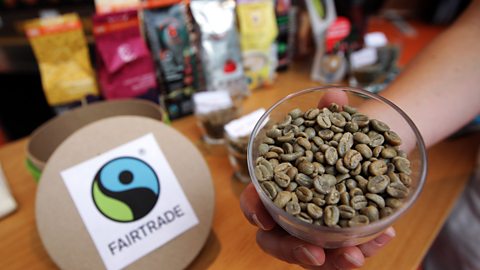Encouraging fair trade though trade blocs and the European Union
Fair trade means that the producer receives a guaranteed and fair price for the product regardless of the price on the world market. It aims to provide:
- minimum wages and safe working conditions
- restrictions on child labour
- protection of the environment
- better schools and healthcare
Fair trade products sometimes cost a little more, but many consumers consider this a small price to pay for the benefits they bring. Fair trade products are becoming more widespread and include tea, coffee, sugar, chocolate and clothing made from fair trade cotton.
When a product is marked with a FAIRTRADE label it means:
- a fair price is paid for the product
- there are opportunities to improve the living standards of people producing the product
- it gives the product a stronger position in the global market

Trade blocs
A trading blocA group of countries who have agreed to share trading agreements, and minimise barriers of trade between them. is a group of countries who have joined together to promote trade. This might be through relaxing barriers to trade, or even having a common currency, and increasing taxes on products brought in from outside the bloc, protecting them from outside competition. Examples of trading blocs include the EU, NAFTA and ASEAN.
The European Union (EU)
The EU is made up of 28 member countries, has a population of over 500 million people and accounts for 25% of global Gross Domestic Product (GDP)Measures the wealth or income of a country. It is the total value of goods and services produced by a country in a year..
- It aims to promote trade by creating a single market where goods, money and people can travel freely between member states. It is believed that all member states will benefit through increased job creation and income.
- 17 of the member states also agreed to use a single currency, the euro. These countries make up an area called the Eurozone.
- Representatives of low income country (LIC)Based on the World Bank's income classifications, a LIC has a gross national income (GNI per capita) of $1,045 or lower., also known as developing countries complain that they cannot get fair access to the European market, due to increased taxes and quotas on their products making them more expensive and therefore less marketable.